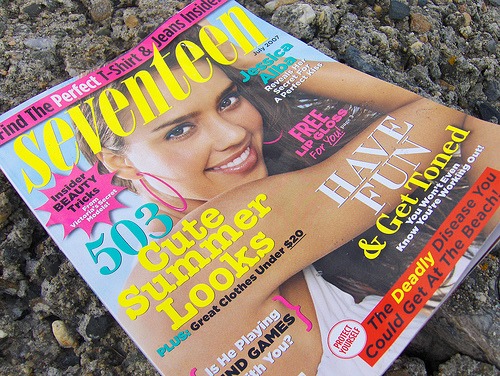Celebrating Julia Bluhm and Finding Hope in New Media
 |
| Photo Credit: Joe Shlabotnik (Flickr/Creative Commons) |
Eighth-grader Julia Bluhm made history and headlines last week when her petition and protests led to Seventeen magazine pledging to not ever alter the face and body shapes of young women featured in its editorial pages.
After hearing too many girls in her ballet class complain about their weight, Bluhm launched a petition on Change.org in April calling for the magazine to print one unaltered photo spread each month. Later she held a demonstration at the corporate offices of Hearst, the company that owns Seventeen. The petition garnered over 84,000 signatures.
Last week the New York Times reported that. Ann Shoket, the magazine’s editor in chief, wrote in the editor’s letter in the August issue that the magazine had drafted a “Body Peace Treaty,” promising not to change girls’ body or face shapes (something Shoket insists the magazine has never done, anyway) and to include only images of real girls and healthy models. This is no doubt a response to Bluhm’s campaign.
As a feminist, this story makes me rejoice with the hope that perhaps we will see more and more magazines start to feature realistic images and celebrate all types of beauty. As a writer, I can’t help but think about the fact that Bluhm’s crusade would not have been a success without new media.
Not only did the Internet allow Bluhm to collect more than 80,000 signatures, but the Web also offers plenty of competition for magazines like Seventeen, as Melissa Harris-Perry pointed out on her show Saturday. With a host of blogs and online publications out there offering girls the tailored beauty, fitness, and fashion advice they could once only find in Seventeen, even this iconic magazine knows that despite its status readers are precious and their complaints need to be taken seriously.
Many writers are afraid of what new media means for our future. Does it mean the death of newspapers, magazines and print books? I don’t know. I hope not, but it could. But that doesn’t mean our voices will be silenced. Julia Bluhm’s story shows us that new media is a great opportunity for all of us — whether we’re activists or artists — to make our voices heard like never before.
Maybe you’re a rebel with a cause who starts a petition like Bluhm did, or writer who publishes an e-book that inspires legions of people, or a blogger who creates an online publication that’s an alternative to the magazines out there that don’t seem to tell the stories of your community.
I live in a city where many of the local newspaper reporters were recently laid off. And the newspaper at which I worked before I moved here no longer exists. So, I have good reasons to have a woeful attitude about new media, but stories like Julia Bluhm’s reminds me I have a good reason to have a hopeful attitude instead.
Maybe you’re a rebel with a cause who starts a petition like Bluhm did, or writer who publishes an e-book that inspires legions of people, or a blogger who creates an online publication that’s an alternative to the magazines out there that don’t seem to tell the stories of your community.
I live in a city where many of the local newspaper reporters were recently laid off. And the newspaper at which I worked before I moved here no longer exists. So, I have good reasons to have a woeful attitude about new media, but stories like Julia Bluhm’s reminds me I have a good reason to have a hopeful attitude instead.
Cross-posted at The Writeous Babe Project.

Leave a comment